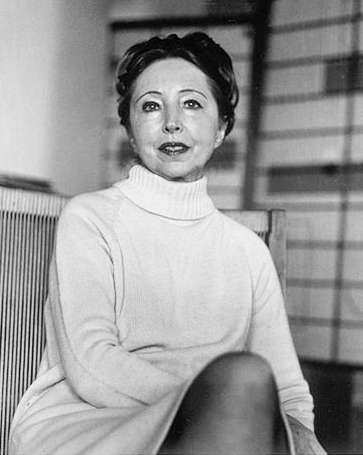Frequently attributed to Nin, but without cited source in her work (possibly due to a quotation in Living on Purpose: Straight Answers to Universal Questions (2000) by Dan Millman that attributed the quote to Nin without source).
In March 2013, a former Director of Public Relations at John F. Kennedy University in Orinda, Elizabeth Appell, claimed she had authored the quote in 1979 for an inspirational header on a class schedule: http://anaisninblog.skybluepress.com/2013/03/who-wrote-risk-is-the-mystery-solved/
Disputed
Variant: The day came when the risk to remain tight in a bud was more painful than the risk it took to blossom.
Works
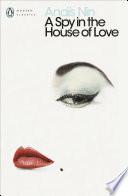
A Spy in the House of Love
Anaïs NinThe Diary of Anaïs Nin
Anaïs Nin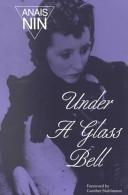
Under a Glass Bell
Anaïs NinCollages (novel)
Anaïs NinIncest: From a Journal of Love
Anaïs Nin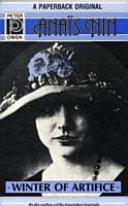
Winter of Artifice
Anaïs Nin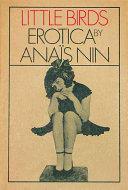
Little Birds
Anaïs NinFamous Anaïs Nin Quotes
“Life shrinks or expands according to one's courage.”
As quoted in French Writers of the Past (2000) by Carol A. Dingle, p. 126
Variant: Life shrinks or expands in proportion to one's courage.
March 1937
Diary entries (1914 - 1974)
Source: The Diary of Anaïs Nin, Vol. 1: 1931-1934
Anaïs Nin Quotes about love
“You cannot save people, you can only love them.”
The Diary Of Anais Nin, Volume Two (1934-1939)
Diary entries (1914 - 1974)
“I love your silences, they are like mine.”
"Je suis le plus malade des Surrealistes"
Source: Under a Glass Bell (1944)
Context: I love your silences, they are like mine. You are the only being before whom I am not distressed by my own silences. You have a vehement silence, one feels it is charged with essences, it is a strangely alive silence, like a trap open over a well, from which one can hear the secret murmur of the earth itself.
Anaïs Nin Quotes about the world
“I believe one writes because one has to create a world in which one can live.”
February 1954 The Diary of Anaïs Nin Vol. 5 (1947-1955), as quoted in Woman as Writer (1978) by Jeannette L. Webber and Joan Grumman, p. 38
Diary entries (1914 - 1974)
Context: Why one writes is a question I can answer easily, having so often asked it of myself. I believe one writes because one has to create a world in which one can live. I could not live in any of the worlds offered to me — the world of my parents, the world of war, the world of politics. I had to create a world of my own, like a climate, a country, an atmosphere in which I could breathe, reign, and recreate myself when destroyed by living. That, I believe, is the reason for every work of art.
Source: The Diary of Anaïs Nin, Vol. 1: 1931-1934
Source: The Diary of Anais Nin Volume 1 1931-1934: Vol. 1
Anaïs Nin: Trending quotes
Anaïs Nin Quotes
“We don't see things as they are, we see things as we are.”
The Seduction of the Minotaur (1961); the documentation of the conflicting citations available on this page ( HNet http://h-net.msu.edu/cgi-bin/logbrowse.pl?trx=vx&list=H-Judaic&month=1108&msg=RizwZWCgeA8woVU9mNOEYQ) seems very thorough, and in the end attributes the quote to this novel, which includes the line:
Lillian was reminded of the talmudic words: "We do not see things as they are, we see them as we are."
With Nin's description of the statement as "Talmudic" it afterwards began to be attributed to the Jewish Talmud, without any cited version or passage.
Similar statements appear in You Can Negotiate Anything (1982) by Herb Cohen: "You and I do not see things as they are. We see things as we are"; and in Awareness (1992) by Anthony de Mello: "We see people and things not as they are, but as we are".
Another similar statement without cited source is also attributed to Nin https://web.archive.org/web/20050322041559/http://learn-gs.org/learningctr/tutorial/4.html: We see the world as "we" are, not as "it" is; because it is the "I" behind the "eye" that does the seeing.
Disputed
Variant: We don't see people as they are. We see people as we are.
Source: Little Birds
Source: Fire: From A Journal of Love - The Unexpurgated Diary of Anaïs Nin
“We write to taste life twice, in the moment and in retrospect.”
February 1954 The Diary of Anaïs Nin, Vol. 5 as quoted in Woman as Writer (1978) by Jeannette L. Webber and Joan Grumman, p. 38
Diary entries (1914 - 1974)
Context: We write to taste life twice, in the moment, and in retrospection. We write, like Proust, to render all of it eternal, and to persuade ourselves that it is eternal. We write to be able to transcend our life, to reach beyond it.
Context: The artist is the only one who knows that the world is a subjective creation, that there is a choice to be made, a selection of elements. It is a materialization, an incarnation of his inner world. Then he hopes to attract others into it. He hopes to impose his particular vision and share it with others. And when the second stage is not reached, the brave artist continues nevertheless. The few moments of communion with the world are worth the pain, for it is a world for others, an inheritance for others, a gift to others, in the end. When you make a world tolerable for yourself, you make a world tolerable for others.
We also write to heighten our own awareness of life. We write to lure and enchant and console others. We write to serenade our lovers. We write to taste life twice, in the moment, and in retrospection. We write, like Proust, to render all of it eternal, and to persuade ourselves that it is eternal. We write to be able to transcend our life, to reach beyond it. We write to teach ourselves to speak with others, to record the journey into the labyrinth. We write to expand our world when we feel strangled, or constricted, or lonely. We write as the birds sing, as the primitives dance their rituals. If you do not breathe through writing, if you do not cry out in writing, or sing in writing, then don't write, because our culture has no use for it. When I don't write, I feel my world shrinking. I feel I am in a prison. I feel I lose my fire and my color. It should be a necessity, as the sea needs to heave, and I call it breathing.
“I hate men who are afraid of women's strength.”
Source: Henry and June: From "A Journal of Love"--The Unexpurgated Diary of Anaïs Nin
“The role of the writer is not to say what we can all say, but what we are unable to say.”
The Diary of Anaïs Nin, Vol. 5, as quoted in Moving to Antarctica : An Anthology of Women's Writing (1975) by Margaret Kaminski
Diary entries (1914 - 1974)
Context: The role of the writer is not to say what we can all say, but what we are unable to say. Most of the writing today which is called fiction contains such a poverty of language, such triteness, that it is a shrunken, diminished world we enter, poorer and more formless than the poorest cripple deprived of ears and eyes and tongue. The writer's responsibility is to increase, develop our senses, expand our vision, heighten our awareness and enrich our articulateness.
February 1947 The Diary of Anaïs Nin Vol. 4 (1944-1947), p. 185
Diary entries (1914 - 1974)
“People living deeply have no fear of death.”
The Diary Of Anais Nin, Volume Two (1934-1939)
Diary entries (1914 - 1974)
“We travel, some of us forever, to seek other states, other lives, other souls.”
Source: The Diary of Anaïs Nin, Vol. 7: 1966-1974
“Most artists have retired too absolutely; they grow rusty, inflexible to the flow of currents.”
November 26, 1932
Diary entries (1914 - 1974)
Context: This abdiction of life demanded of the artist is to be achieved only relatively. Most artists have retired too absolutely; they grow rusty, inflexible to the flow of currents.
Source: The Diary of Anaïs Nin, Vol. 4: 1944-1947
“Sometimes we reveal ourselves when we are least like ourselves.”
Source: Henry and June: From "A Journal of Love"--The Unexpurgated Diary of Anaïs Nin
D. H. Lawrence : An Unprofessional Study (1932); also quoted in The Mirror and the Garden : Realism and Reality in the Writings of Anais Nin (1971) by Evelyn J. Hinz, p. 40
“I postpone death by living, by suffering, by error, by risking, by giving, by losing.”
March, 1933 http://books.google.com/books?id=Ps_DtS_PFb4C&q=%22I+postpone+death+by+living+by+suffering+by+error+by+risking+by+giving+by+losing%22&pg=PT203#v=onepage
Diary entries (1914 - 1974)
Source: The Diary of Anaïs Nin, Vol. 1: 1931-1934
“What I cannot love, I overlook.”
Variant: What I cannot love, I overlook. Is that real friendship?
“The truly faithless one is the one who makes love to only a fraction of you. And denies the rest.”
February, 1932
Diary entries (1914 - 1974)
Variant: She lacks the core of sureness, she craves admiration insatiably. She lives on reflections of herself in others' eyes. She does not dare to be herself.
Source: Henry and June: From "A Journal of Love"--The Unexpurgated Diary of Anaïs Nin
“Feelings are images, sensations are like musical sounds.”
February, 1932<!-- p. 51 -->
Diary entries (1914 - 1974)
Context: We don't have a language for the senses. Feelings are images, sensations are like musical sounds.
“All writers have concealed more than they revealed.”
The Diary of Anaïs Nin, Vol. 5
Diary entries (1914 - 1974)
Context: One handles truths like dynamite. Literature is one vast hypocrisy, a giant deception, treachery. All writers have concealed more than they revealed.
Children of the Albatross (1947)
Context: In the world of the dreamer there was solitude: all the exaltations and joys came in the moment of preparation for living. They took place in solitude. But with action came anxiety, and the sense of insuperable effort made to match the dream, and with it came weariness, discouragement, and the flight into solitude again. And then in solitude, in the opium den of remembrance, the possibility of pleasure again.
The Diary of Anaïs Nin Vol. 4 (1971); as quoted in Journal of Phenomenological Psychology Vol. 15 (1984)
Diary entries (1914 - 1974)
Context: We do not grow absolutely, chronologically. We grow sometimes in one dimension, and not in another, unevenly. We grow partially. We are relative. We are mature in one realm, childish in another. The past, present, and future mingle and pull us backward, forward, or fix us in the present. We are made of layers, cells, constellations.
Winter, 1931-1932 The Diary of Anaïs Nin , Volume One 1931-1934 <!-- p. 11 -->
Diary entries (1914 - 1974)
Context: I had always believed in Andre Breton's freedom, to write as one thinks, in the order and disorder in which one feels in thinks, to follow sensations and absurd correlations of events and images, to trust to the new realms they lead one into. "The cult of the marvelous." Also the cult of the unconscious leadership, the cult of mystery, the evasion of false logic. The cult of the unconscious as proclaimed by Rimbaud. It is not madness. It is an effort to transcend the rigidities and the patterns made by the rational mind.
February 1954 The Diary of Anaïs Nin, Vol. 5 as quoted in Woman as Writer (1978) by Jeannette L. Webber and Joan Grumman, p. 38
Diary entries (1914 - 1974)
Context: The artist is the only one who knows that the world is a subjective creation, that there is a choice to be made, a selection of elements. It is a materialization, an incarnation of his inner world. Then he hopes to attract others into it. He hopes to impose his particular vision and share it with others. And when the second stage is not reached, the brave artist continues nevertheless. The few moments of communion with the world are worth the pain, for it is a world for others, an inheritance for others, a gift to others, in the end. When you make a world tolerable for yourself, you make a world tolerable for others.
We also write to heighten our own awareness of life. We write to lure and enchant and console others. We write to serenade our lovers. We write to taste life twice, in the moment, and in retrospection. We write, like Proust, to render all of it eternal, and to persuade ourselves that it is eternal. We write to be able to transcend our life, to reach beyond it. We write to teach ourselves to speak with others, to record the journey into the labyrinth. We write to expand our world when we feel strangled, or constricted, or lonely. We write as the birds sing, as the primitives dance their rituals. If you do not breathe through writing, if you do not cry out in writing, or sing in writing, then don't write, because our culture has no use for it. When I don't write, I feel my world shrinking. I feel I am in a prison. I feel I lose my fire and my color. It should be a necessity, as the sea needs to heave, and I call it breathing.
House of Incest (1936)
Context: The morning I got up to begin this book I coughed. Something was coming out of my throat: it was strangling me. I broke the thread which held it and yanked it out. I went back to bed and said: I have just spat out my heart.
Collages (1964), p. 114
The Diary of Anaïs Nin, Vol. 5, as quoted in Moving to Antarctica : An Anthology of Women's Writing (1975) by Margaret Kaminski
Diary entries (1914 - 1974)
Context: The role of the writer is not to say what we can all say, but what we are unable to say. Most of the writing today which is called fiction contains such a poverty of language, such triteness, that it is a shrunken, diminished world we enter, poorer and more formless than the poorest cripple deprived of ears and eyes and tongue. The writer's responsibility is to increase, develop our senses, expand our vision, heighten our awareness and enrich our articulateness.
March 6, 1936 Fire
Diary entries (1914 - 1974)
“You just say "Anna" and then add "ees," with the accent on the "ees."”
Summer 1966, in The Diary Of Anais Nin, Volume 7 (1966-1974)
Diary entries (1914 - 1974)
Context: At a lecture I am asked to pronounce my name three times. I try to be slow and emphatic, "Anaïs — Anaïs — Anaïs. You just say "Anna" and then add "ees," with the accent on the "ees."
